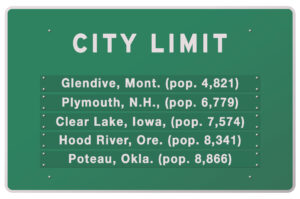 Small towns can present big challenges for flooring retailers. While urban centers are usually overflowing with customers, resources and networking opportunities, those benefits can be harder to come by in areas with fewer than 10,000 residents. Floor Covering News spoke with retailers who do business low-populated areas to discuss the unique challenges they face.
Small towns can present big challenges for flooring retailers. While urban centers are usually overflowing with customers, resources and networking opportunities, those benefits can be harder to come by in areas with fewer than 10,000 residents. Floor Covering News spoke with retailers who do business low-populated areas to discuss the unique challenges they face.
Challenge #1:
Finding qualified installers
Access to skilled and/or available labor in low-populated areas was by far the biggest challenge cited by flooring retailers Floor Covering News contacted. Randy Bridgman, owner of Bridgman’s Furniture in Poteau, Okla., (population 8,866) said the carpet installer has become a dying breed in his small city. “There doesn’t seem to be younger ones getting into the business, and the older ones are retiring out,” he said. “Their bodies are [worn] out.”
Calvin Unruh, owner of Cal’s Carpet in Glendive, Mont., (population 4,821), agreed. “It’s a very small labor pool—both skilled and unskilled,” he said, adding that’s why his store tries very hard to keep the installers they have at present. “We try to treat them very well and make it more than just about the pay. We try to have flexibility when they need time off for appointments or family.”
Unruh added that even for those individuals wanting to become installers, there are fewer places, if any, for them to learn the trade in a small town or low-populated areas. “It’s strictly on-the-job training,” he said. “You’d have to travel maybe 500 miles where you can send someone to attend a class of some kind, but locally there are just none.”
Challenge #2:
Operating efficiently
The dearth of installers, according to Sherry Sears, bookkeeper/scheduler for Swell City Decor, Hood River, Ore., (population 8,341), affects her store’s ability to conduct business quickly and efficiently. “That’s the hardest part,” she stated. “If we make a sale in December, I may have to book the installation in February the following year—three months later.”
Her solution? Honesty. “We’re upfront about it, and the customer is usually pretty understanding,” Sears said. “That’s the nice part about a small community—it’s like a big, giant family.”
Sometimes, though, customers balk. “Customers do not understand that with a lack of good installers our schedule is quite extended,” said Chris Masters, owner of Master Floors Carpet One Floor & Home in Clear Lake, Iowa, (population: 7,574). “We always make sure we tell our customers how far out we estimate the installation will be. We also explain that we could get their product installed sooner—but only if we use other installers that we do not believe perform to our expectations.”
Challenge #3:
Securing a consistent source of supply
Finding qualified installers is not the only aspect of small-town business that affects operational efficiency. When you’re far from urban centers—as is the case with Unruh of Cal’s Carpet—there can be a long wait for product, too. “Our nearest distributor is over 200 miles away, so we have to stock a lot of stuff,” he explained. “We can’t just run over and grab something. We have to wait until they get a load and come in our direction. We may wait up to three weeks from the time the order is placed to getting the product.”
To remedy that situation, Unruh buys proactively. “We try to think way ahead and order in advance,” he explained. “We gotta keep product on the shelf.”
That’s the same issue David Lurie, vice president of Plymouth Furniture, based in Plymouth, N.H., (population: 6,779), has to contend with. “The hardest thing we have to deal with is getting product in a quick time frame without paying a lot of freight,” he explained.
That’s why it’s important to partner with the right distributor—Augusta, Maine-based NRF, in Lurie’s case. “They inventory and they deliver on their fleet of trucks two times a week.”
Challenge #4:
Competing against big-box stores
Going head-to-head with big-box stores and home centers is a challenge for virtually all flooring retailers in both small and big cities alike. However, retailers doing business in low-populated areas are often selling to a finite population or one that is declining. That means they are competing for fewer customers, making repeat business essential.
Plymouth Furniture’s Lurie fights back in the best way he knows how—by providing a personal touch. “We give the customer great service from the first time they walk through our door, and we follow up on each job that we complete,” he explained. “In a small town, friends talk to other friends and they tell their friends what a great experience they had doing business with us.”
Although Cal Carpet’s Unruh said there’s only two big-box stores “a hundred miles away,” it’s still an issue. But like Lurie, he noted that stepping up customer service is vital and stressed that he lets customers know he always stands behind what he sells. “Reputation is everything in a small town,” he explained. “Nobody bats 1,000 if you have one job go south. The whole town knows about it in no time.”
Swell City Décor’s Sears takes a more direct approach with customers with regard to big-box stores. “We can’t compete with prices or offer the same deals; we don’t have those company credit cards or payment plans. However, those stores can’t compete with us on quality, and we tell our customers that. We tell ’em, ‘You get what you pay for.’”
